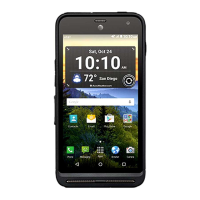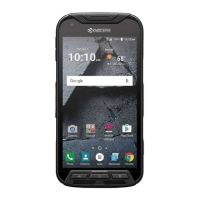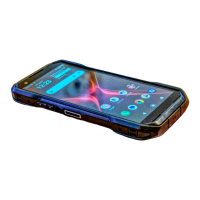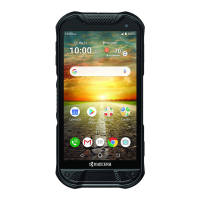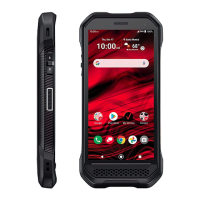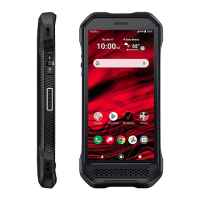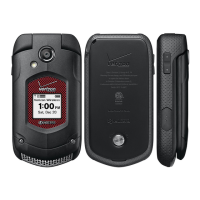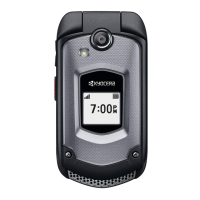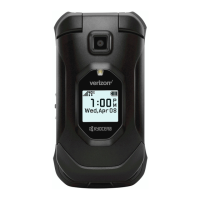Do you have a question about the Kyocera DuraForce and is the answer not in the manual?
Overview of the phone's external features and keys for initial setup.
Instructions on inserting SIM card and charging the battery to begin phone setup.
Steps to properly insert a Nano SIM card into the phone's designated slot.
Guide to fully charge the battery using the provided charger before powering on.
Procedures for powering the phone on, off, and restarting it.
Explains various tap gestures and interactions for controlling the phone's touchscreen.
Introduces the home screen as the main point for accessing apps and functions.
Details the components of the home screen, including status bar, search bar, widgets, and shortcuts.
Covers methods for typing text, including touchscreen keyboards and voice input.
Explains the QWERTY keyboard setup for text entry with enhancements.
Provides various methods for initiating phone calls from your device.
Step-by-step instructions for making calls using the phone's dialpad.
Guide on placing calls directly from saved contact entries.
Instructions to call emergency services like 911, even when the phone is locked.
Details useful features and options available within the phone's calling application.
Explains onscreen options available during an active phone call, like hold, mute, and speaker.
Information on scrolling through and viewing all stored contacts.
Steps to enter and save details such as name, phone numbers, and email addresses.
Guide on modifying existing contact information, adding pictures, or ringtones.
How to register emergency contacts for rescue personnel identification.
Managing your Google account for accessing services like Gmail and Play Store.
Guide to access, read, and manage your personal Gmail account messages.
Managing email accounts, sending, and receiving emails from various providers.
How to compose and send email messages, including attachments.
Sending and receiving text (SMS) and multimedia (MMS) messages.
Quickly composing and sending text messages to recipients.
Accessing the digital content store for apps, books, movies, and music.
Steps to search for, download, and install applications from the Play Store.
Guide on removing downloaded applications from the phone.
Using location-based navigation programs to find directions and places.
Utilizing the Maps app to determine location, find directions, and explore places.
How to search for specific locations, addresses, or businesses on the map.
Obtaining driving, transit, or walking directions to a destination.
Using the app to play audio files, including DRM-protected content.
Browsing and playing music tracks within the Music Player app.
Connecting to wireless networks for Internet access.
Enabling Wi-Fi and connecting to available wireless networks.
Configuring Wi-Fi options, including advanced settings.
Using data connections like 4G LTE for Internet access.
Opening the web browser to access the Internet.
Navigating websites and managing browsing history and bookmarks.
Accessing the phone's built-in web browser.
Customizing browser behavior, privacy, and security settings.
Turning the phone into a Wi-Fi hotspot to share its Internet connection.
Configuring and activating the mobile hotspot feature.
Instructions for opening and using the camera application.
Steps to capture photos and record videos with the phone's camera.
Viewing and managing captured photos or videos immediately after taking them.
Adjusting various settings for the camera and camcorder.
Browsing and viewing media files stored on the phone or SD card.
Basic editing tools for photos, including cropping and color adjustments.
Sending media files via email, messaging, Bluetooth, or social networks.
Creating and managing events, meetings, and appointments.
Adding new events to the calendar directly from the application.
Displaying calendar events in different views like daily, weekly, or monthly.
Using the phone as a clock, alarm, timer, or stopwatch.
Setting and managing alarms for timely notifications.
Utilizing voice commands for phone functions and text conversion.
Using voice to dial numbers, open apps, or perform tasks.
Connecting wirelessly to Bluetooth devices like headsets and speakers.
Enabling or disabling the phone's Bluetooth capability.
Pairing and connecting Bluetooth accessories for audio or calls.
Managing storage expansion using a microSD card.
Instructions for inserting and removing a compatible microSD card.
Organizing and managing files stored on the phone or microSD card.
Downloading and installing software updates for the phone.
Configuring Wi-Fi network connections and advanced options.
Managing Bluetooth connections and device settings.
Monitoring and managing the phone's data consumption.
Checking data usage statistics by application and time period.
Accessing additional wireless and network options.
Disabling wireless communications for flights or sensitive areas.
Managing mobile data access, network modes, and operators.
Enabling or disabling mobile data services for Internet access.
Adjusting audio settings, including volumes, ringtones, and notifications.
Controlling audio levels for media, ringtones, alarms, and system sounds.
Assigning a specific ringtone for incoming calls.
Customizing screen appearance and behavior.
Adjusting screen brightness for optimal visibility and battery saving.
Enabling automatic screen orientation changes based on phone rotation.
Managing phone and microSD card storage space.
Managing storage when connected to a computer via USB.
Monitoring battery usage and charging notifications.
Viewing and managing installed applications on the phone.
Controlling phone location services and data collection.
Enhancing screen security with various lock options.
Setting up screen locks like pattern, PIN, or password for security.
Configuring encryption, password visibility, administrator settings.
Protecting phone and SD card data through encryption.
Changing the password for device reset and factory data reset.
Selecting phone language and configuring input methods.
Customizing the behavior and options of the Google Keyboard.
Backing up data to Google servers and resetting the phone.
Restoring the phone to its original factory settings.
Adding and managing email, social networking, and sharing accounts.
Enabling and managing features for users with disabilities.
Providing spoken feedback for visually impaired users.
| Shock Resistance | MIL-STD-810G |
|---|---|
| Operating System | Android |
| Processor | Qualcomm Snapdragon |
| Expandable Storage | microSD |
| Water Resistance | IP |
